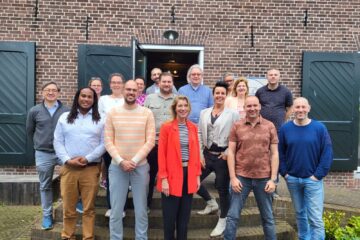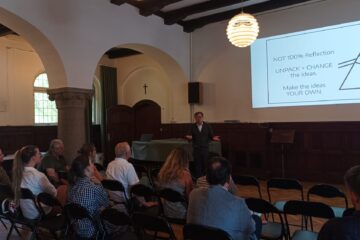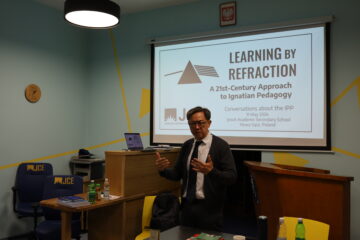From March 6 to 8, 2024, 38 educators from 13 schools gathered at the Archbishop Brunett Retreat Center at the Palisades for the Jesuits West Province Colloquium. This year’s colloquium—organized as always by Tim Caslin and Mike Chambers, Provincial Assistant and Associate Provincial Assistant for Secondary and Pre-Secondary Education, respectively—focused on Ignatian Pedagogy, specifically, the Learning by Refraction approach.
Fr. Johnny Go SJ, author of the book of the same title, flew in from Manila to introduce the participants to this contemporary and practical approach and to guide them in thinking and talking about concrete ways of implementing the IPP.
Fr. Go offered “conversation pieces” to provoke thinking and talking about Ignitian Pedagogy.
The colloquium was designed to model the principles of the IPP. As one participants observed, even if the topic was dense, the presentation made the topic accessible, engaging, and relevant. “Think time” was regularly and strategically provided for the participants to reflect on the ideas presented, to chat about them with their seat mates, making the concepts and principles easier to understand and more readily put into practice.
The small group discussions were just as crucial as the plenary sessions. A number of participants expressed their appreciation for many opportunities provided them to connect with colleagues from the other schools and discuss ideas with them. Many found this experience “life-giving.” Chris Vielleux, a Spanish teacher at Sacred Heart High School, shared: “I liked the fact that we had moments to discuss and collaborate with teachers in our content area and also teachers from our school.”
Fr. Go’s presentation also demonstrated how Ignatian Pedagogy is more relevant than ever in the age of social media and Generative AI and how it can serve as an umbrella to help make sense of different PD initiatives that tend to be “flavors of the month.”
The participants were quite engaged and active in the various sessions.
Joshua Bird, who teaches English and Creative Writing at Loyola Sacred Heart High School and is doing his doctoral studies in education, was happy to discover the somewhat contemporary nature of the IPP: “…I liked that this Pedagogy is clearly linked to best teaching practices that are backed by extensive research, even though that was not explicitly mentioned. The terminology might be slightly different and the organization of the framework is slightly different, but the ideas and theories are based around the same philosophy, research, and educational theories.”
The retreat center was a lovely venue for the colloquium,
located right by the Puget Sound.
Given the time limitation, the colloquium prioritized the two components of the IPP that Fr. Go described as its defining ingredients: Reflection and Action.
Andrea Casey, Director of the Arrupe Center for Justice at Jesuit High School in Portland, said that she used to think formulating insights was complicated, but at the colloquium she realized that insights are “the guiding takeaways for students. They can be big picture or very specific.”
Her colleague in the same high school, Greg Allen, who had undergone the Jesuit School Network’s (JSN) virtual MasterClass on the IPP, has been involved in training teachers on Learning by Refraction. He shared what he considered his most valuable takeaway from this colloquium: “Insights need guiding questions that are planned well and in advance in order to have students understand and arrive at them. This work of Learning by Refraction could be workshopped to an entire school’s faculty in sessions, but now I think smaller groups of similar disciplines are a better approach to teaching this material.”
At the end of the colloquium, one participant expressed a renewed appreciation of Ignatian Pedagogy, especially its uniqueness in how it leads us to go beyond the minimum standards, to explore more in-depth questions that tie into the Ignatian mission.
Fr. Simon celebrated the Eucharist with students from the nearby Nativity School to provide the music.
Dan O’Connell, Assistant Principal of Faculty Development at Loyola High School (Los Angeles) said that what he valued the most was“having an opportunity at the end to meet with my school team to determine how best to bring this back and link it to other initiatives we have going on.”
Hailey Maher, who teaches English at Bellarmine Prep (Tacoma), shared that she learned more about the IPP from this experience than similar PDs she had attended before.
The participants of the 2024 Jesuits West Province Colloquium
A number of the participants also expressed their relief that contrary to their expectation, IPP did not turn out to be as overwhelming as they had expected. Lee Holiday of Loyola Sacred Heart said that prior to attending the colloquium, she wasn’t sure what the IPP was all about and was relieved that she didn’t have to change her entire teaching paradigm. Annie Senner, a Spanish teacher at Bellarmine Prep (Tacoma), added, “Now I see how it includes many of the practices I already incorporate and have learned about, and that I am capable of making small adjustments to be a more effective teacher with the IPP.”Like the gracious hosts that they were,Tim and Mike made sure that the socials and dinners were equally important fellowship opportunities so that the participants could relax and get to know one another better. The Eucharist on the last night, presided over by Fr. Simon Zachary SJ of Seattle Prep, as well as the Examen and faith sharing after dinner as facilitated by Mike, were appropriate occasions for thanksgiving for all the blessings received at this colloquium.


